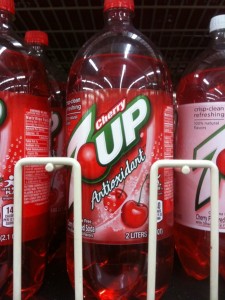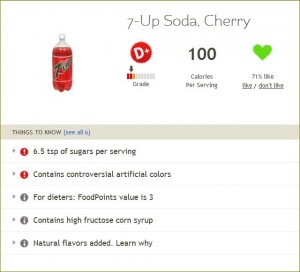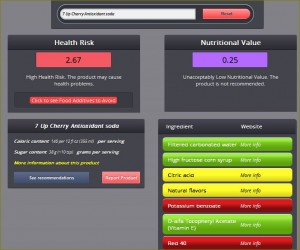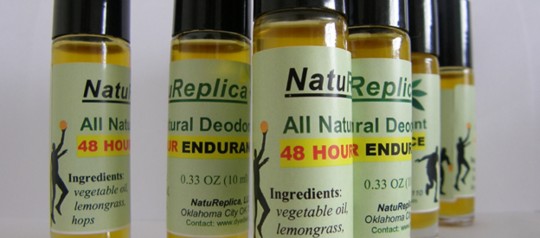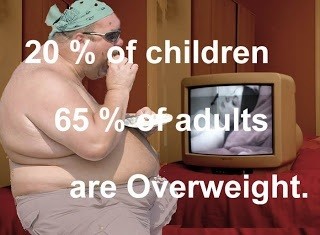7 Up Cherry stops false antioxidant claims
The role of Antioxidants in our diet
I have reviewed this drink not so long ago in an article: Do not fool yourself with 7 UP Cherry Antioxidant soda. Antioxidant is a substance which is capable of slowing down or suppressing the oxidation of other substances, more importantly, the ones that play critical roles in cell biochemistry. Oxidation process may include and lead to formation of free radicals which in turn may trigger destructive chain reactions in the cell. Antioxidants may quench these chain reactions by scavenging free radicals.
Some examples of common antioxidants include natural substances like vitamin C, vitamin A, vitamin E, glutathione and polyphenols that come to our diet with fruits and vegetables. Artificial food preservatives like BHT and TBHQ are antioxidants too but their chemical nature does not really match the chemistry of living cells so their antioxidant effect is inappropriate and hence may cause more harm than good. Many artificial colorants are in fact oxidants, that is opposite of being antioxidants, because they belong to azo compounds which contain -N=N- (nitrogen-nitrogen) structural fragment.
It is always good to keep in mind that too much of anything – natural antioxidants are not an exception (!) – can be health damaging. This is because the fine-tuned redox (reduction-oxidation) chemistry which occurs in living cells every moment of life can be adversely affected by either an excess of oxidant (mostly oxygen) or an excess of antioxidant (can be a vitamin!). Therefore the way we eat and how much we exercise are critical factors which may affect the redox balance and, in the long run, the quality of our life and our longevity.
The lawsuit against 7 UP
About a year ago the manufacturer of 7 UP (Dr Pepper Snapple Group) was facing a lawsuit by CSPI over its practice of touting an added Vitamin E antioxidant in its regular and diet Cherry Antioxidant, Mixed Berry Antioxidant, and Pomegranate Antioxidant varieties. Despite the nice pictures of cherries, blackberries, cranberries, raspberries, and pomegranates on various 7UP labels, the drinks did not contain any fruit or juice at all.
Here is 7 Up Cherry Antioxidant soda in the view of the two Food Rating Systems: Fooducate and the DyeDiet Calculator.
|
7 Up Cherry Antioxidant soda
|
|
CONTAINS:Water, HFCS + preservatives,+ Vitamin E + artificial color Red 40 |
|
10 teaspoons of sugar per serving (57 tsp. per bottle)
|
| DyeDiet:HR = 2.67 (high health risk);NV = 0.25 (unacceptably low nutrition value) |
| Fooducate: Red D+ |
This time the both approaches are in full agreement by giving very poor rating to the popular drink with overblown antioxidant statements. The DyeDiet result (you will have to type in 7 Up to see the result) shows high health risk (HR = 2.67) and unacceptably low nutritional value (NV = 0.25). Fooducate result is presented by Red D+ rating and two warnings concerning high sugar content and the presence of artificial coloring. I don’t see a reason why those who still like drinking 7UP would not think twice before buying a next bottle. Indeed how can you benefit from drinking HFCS-sweetened water containing a mixture of Vitamin E antioxidant and Red 40 azo dye oxidant?
The good news is that 7 UP has recently decided to stop adding Vitamin E and drop antioxidant claims. A study of March 2013 revealed that as many as 180,000 people around the world die each year because of diseases brought upon by sugary drinks like soda. “Soda is not a health food, and should not be marketed as a healthy source of antioxidants or other nutrients,” CSPI litigation director said in a press release. So watch now for new looking 7 UP Cherry without false antioxidant claims but remember that the only drink which perfectly suits or body needs is pure water!
Category: Food Dyes Exposure, Soft drinks

